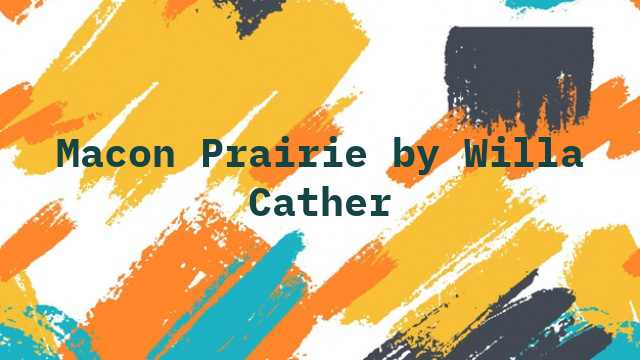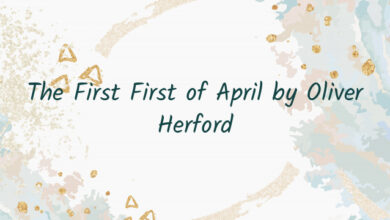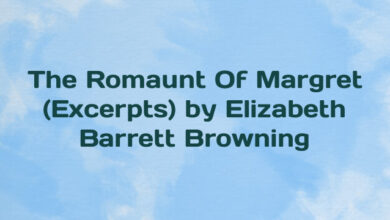
Macon Prairie by Willa Cather
Published in Cather’s collection, April Twilights and other Poems, 1923.
She held me for a night against her bosom,
The aunt who died when I was yet a baby,
The girl who scarcely lived to be a woman.
Stricken, she left familiar earth behind her,
Mortally ill, she braved the boisterous ocean,
Dying, she crossed irrevocable rivers,
Hailed the blue Lakes, and saw them fade forever,
Hungry for distances;—her heart exulting
That God had made so many seas and countries
To break upon the eye and sweep behind her.
From one whose love was tempered by discretion,
From all the net of caution and convenience
She snatched her high heart for the great adventure,
Broke her bright bubble under far horizons,—
Among the skirmishers that teased the future,
Precursors of the grave slow-moving millions
Already destined to the Westward-faring.
They came, at last, to where the railway ended,
The strange troop captained by a dying woman;
The father, the old man of perfect silence,
The mother, unresisting, broken-hearted,
The gentle brother and his wife, both timid,
Not knowing why they left their native hamlet;
Going as in a dream, but ever going.
In all the glory of an Indian summer,
The lambent transmutations of October,
They started with the great ox-teams from Hastings
And trekked in a southwesterly direction,
Boring directly toward the fiery sunset.
Over the red grass prairies, shaggy-coated,
Without a goal the caravan proceeded;
Across the tablelands and rugged ridges,
Through the coarse grasses which the oxen breasted,
Blue-stem and bunch-grass, red as sea-marsh samphire.
Always the similar, soft undulations
Of the free-breathing earth in golden sunshine,
The hardy wind, and dun hawks flying over
Against the unstained firmament of heaven.
In the front wagon, under the white cover,
Stretched on her feather-bed and propped with pillows,
Never dismayed by the rude oxen’s scrambling,
The jolt of the tied wheel or brake or hold-back,
She lay, the leader of the expedition;
And with her burning eyes she took possession
Of the red waste,—for hers, and theirs, forever.
A wagon-top, rocking in seas of grasses,
A camp-fire on a prairie chartless, trackless,
A red spark under the dark tent of heaven.
Surely, they said, by day she saw a vision,
Though her exhausted strength could not impart it,—
Her breathing hoarser than the tired cattle.
When cold, bright stars the sunburnt days succeeded,
She took me in her bed to sleep beside her,—
A sturdy bunch of life, born on the ocean.
Always she had the wagon cover lifted
Before her face. The sleepless hours till daybreak
She read the stars.
“Plenty of time for sleep,” she said, “hereafter.”
She pointed out the spot on Macon prairie,
Telling my father that she wished to lie there.
“And plant, one day, an apple orchard round me,
In memory of woman’s first temptation,
And man’s first cowardice.”
That night, within her bosom,
I slept.
Before the morning
I cried because the breast was cold behind me.
Now, when the sky blazes like blue enamel,
Brilliant and hard over the blond cornfields,
And through the autumn days our wind is blowing
Like the creative breath of God Almighty—
Then I rejoice that offended love demanded
Such wide retreat, and such self-restitution;
Forged an explorer’s will in a frail woman,
Asked of her perfect faith and renunciation,
Hardships and perils, prophecy and vision,
The leadership of kin, and happy ending
On the red rolling land of Macon prairie.




